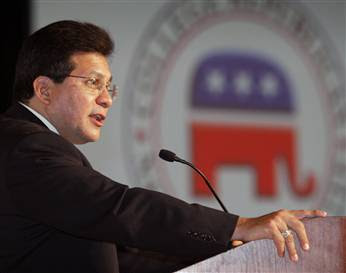From
Campus Progress
Secular Confession
A congressman comes clean about his non-belief in God. By Michael Corcoran
Wednesday March 21, 2007
Representative Fortney Pete Stark (D-CA) has come out of the closet: he is the first U.S. Congressman in history to admit to being a non-theist (any person, atheist, agnostic or otherwise who does not believe in a deity), acknowledging that he doesn’t “believe in a supreme being.” He made the admission to the Secular Coalition for America on March 12 and it was reported in the Los Angeles Times.
“This is very exciting for us,” said Ron Millar of the Secular Coalition in an interview with Campus Progress. “Hopefully this will enable others to feel comfortable in coming forward.”
But the fact that only one member of Congress openly represents the nation’s humanists, agnostics, and atheists, is a sad reminder of America’s prejudice towards non-believers.
According to a national survey done last year by researchers in the University of Minnesota’s department of sociology, atheists are the least trusted minority group in America. They are also the group that parents would least like their children to marry. “Atheists,” said Penny Edgell, the lead researcher in the study, “offer a glaring exception to the rule of increasing social tolerance over the last 30 years.”
Moreover, only 45 percent of Americans said they would vote for an atheist in a presidential election if their party nominated a well-qualified candidate, according to a recent USA Today/Gallup poll. Atheists ranked below every other group listed: African Americans (95 percent), women (88 percent), Hispanics (87 percent), people who have been married three times (67 percent), people over age 72 (57 percent), and gays (55 percent).
These polls may explain why non-theists are woefully underrepresented in government. Even with Stark’s announcement, no out-of-the-closet atheist has ever won a federal election. “If the number of non-theists in Congress reflected the percentage of non-theists in the population,” said Lori Lipman Brown, director of the Secular Coalition, based on their estimate that 10 percent of the American public is non-theist, “there would be 53-54 non-theistic Congress members instead of one.”
Of course, it is statistically improbable that only one of the 535 members of Congress do not believe in a higher being. But there would clearly be genuine political consequences for a religious skeptic to speak out openly about the issue. Which may explain why, on top of Stark, only three other public officials—all from local governments—have identified themselves as non-theists, according to the Secular Coalition.
And therein lies the problem. “We are so closeted,” said David Silverman, spokesman for American Atheists. “The stereotypes propagated by religious groups stick. They are not challenged—but they should be.”
Indeed, leaders of the religious right, who represent about a quarter of the electorate, often smear atheists as amoral cretins. So it was no surprise that the religious right moved quickly to condemn Stark’s announcement. The Christian Seniors Association called Stark’s revelation a “sad benchmark for America” that could “be the moment which defines the decline of our country.”
Of course, what they call “sad,” many call progress. And the youth of our nation seem well-positioned to make progress on the issue. Polls show that America’s young people are more tolerant than older people on a wide range of contentious social issues. According to a Pew Research Center poll, people born between 1981 and 1988 are the most accepting of gay rights, interracial marriage, and immigrants. Moreover, they are more skeptical of creationist dogma than any other age group.
About 20 percent of that demographic, what Pew refers to as “Generation Next,” identify themselves as either atheist, agnostic, or having no religion—up from 10 percent a generation ago, and about twice the national average.
Silverman notes that new technology and the rise of the Internet has created a “smaller world” and enabled young people to “seek viewpoints from other parts of the world that are quite tolerant of secularism.”
So there is every reason to be optimistic that the next generation of leaders will not need to rely on the actions of one congressman, who has unfortunately made intolerant statements of his own—he once called another congressman “a little fruitcake” during a hearing —and instead foster a real sea change in the way the country views the non-religious.
Religion has no monopoly on morality. And the non-believers among us are our friends, coworkers, and our family; they fight our wars, teach our kids, and care for our sick.
They also help to rebuild our cities. In 2006, the New Orleans Secular Humanist Association was almost excluded from an “ecumenical prayer service” about Hurricane Katrina sponsored by the city, despite the fact that humanist organizations raised thousands of dollars to help rebuild New Orleans. After a long struggle to be included, Harry Greenberger, a board member of the New Orleans Secular Humanist Association, was able to speak at the event.
“For us secular non-religious people, our strength and dedication to Katrina recovery comes from the acceptance that we live in a natural, not supernatural, world and that the quality of our lives and surroundings depends entirely on what we ourselves do, and our cooperation with other humans,” said Greenberger. “We are equally important in the rebirth and rebuilding of our city. Our losses are as great as all others in the area; our grief is as deep; our empathy for others is as sincere; and our recovery is as deserved.”
Until our country realizes that non-theists can be good, caring people, we will never shake the ugliness of hate and prejudice that pollutes our society. Though he may not be the ideal spokesperson for them, Rep. Stark has taken a bold, courageous step. Let the next generation lead the way from here.

